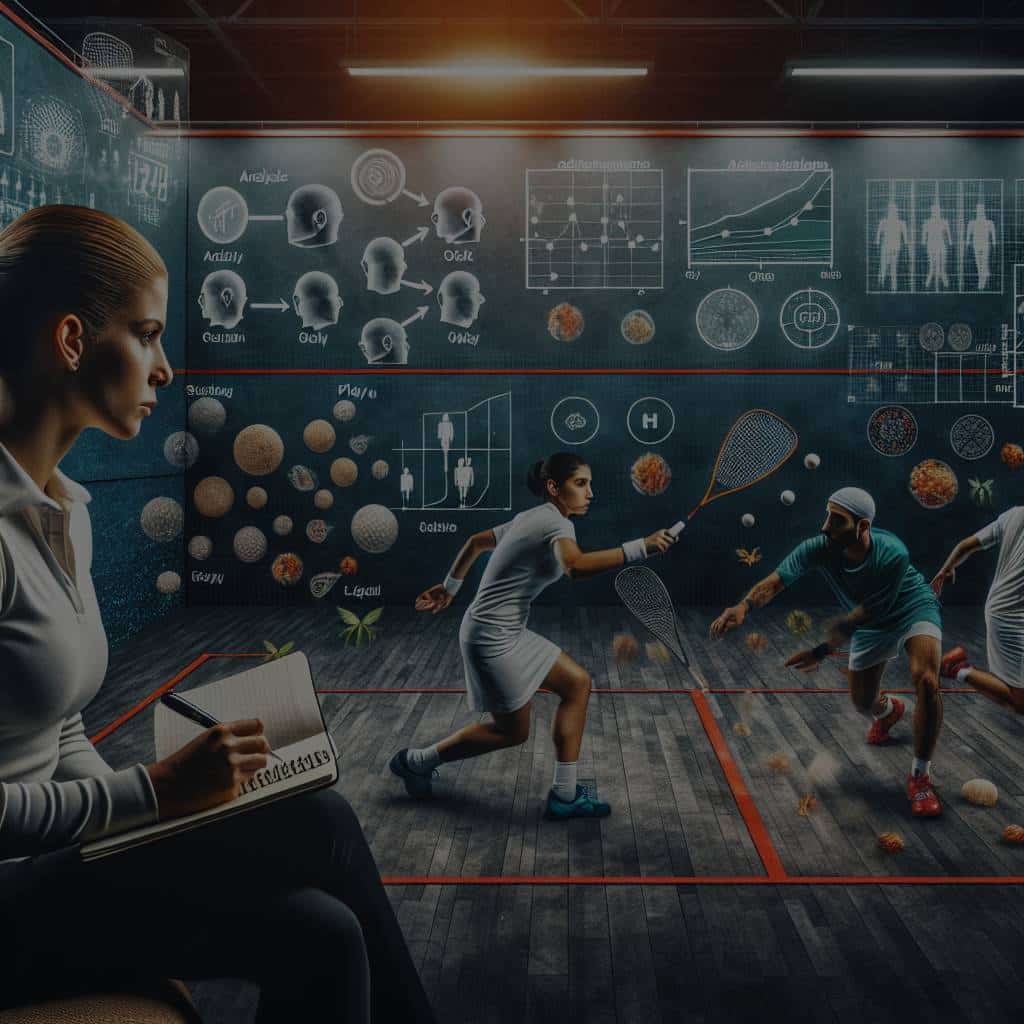How Can Squash Players Analyze and Adapt to Opponents’ Playing Styles Efficiently?

In the fast-paced, unpredictable world of squash, one of the greatest challenges can be understanding and adapting to the playing styles of your opponents. Squash, a game of quick reflexes and strategic shots, requires players to constantly be on their toes, ready to respond to whatever the opponent throws their way. It’s not just about having the perfect shot or the fastest speed; it’s about understanding the science of the game and using it to your advantage. This article will explore the ways in which squash players can effectively analyze and adapt to their opponent’s playing style.
Understanding the Science of Squash
The first step in playing an effective match of squash is understanding the science behind the game. This involves recognizing the physics of the ball, understanding the geometry of the court, and leveraging these to predict and respond to the shots your opponent is likely to play.
Also to discover : What Are the Latest Innovations in Treadmill Technology for Long-Distance Runners?
Squash balls, when warmed up, bounce higher and move faster. This means that the first few shots of the game, when the ball is still cool, can be drastically different from the rest. You need to be aware of this shift and adapt your play accordingly.
The court’s geometry also plays a key role in the game. A standard squash court has four walls, each offering a unique bouncing angle for the ball. Understanding these angles and how they can be used to manipulate the ball’s trajectory is a skill that can give you a significant edge over your opponent.
In the same genre : How Can Team Synergy Be Measured and Enhanced in Professional Basketball?
Analyzing Your Opponent’s Playing Style
A crucial part of any squash match involves analyzing your opponent’s playing style. Are they aggressive, favouring forceful shots that keep you on the back foot? Or are they more defensive, exploiting the spaces in the court and forcing you to run back and forth?
Start by observing your opponent’s preferred shots. Do they tend to play the ball to the back of the court, or do they like to play short, sharp shots that cut off your time? Pay attention to their serve; it can often hint at their overall playing style.
Take note of how your opponent responds to different situations. Do they crumble under pressure, or do they step up their game? Are they more comfortable with a fast-paced game, or do they prefer a slower, more methodical pace? All these observations can help you strategize and plan your shots to throw your opponent off balance.
Adapting Your Game to Your Opponent’s Style
Once you’ve analyzed your opponent’s playing style, it’s time to adapt your game. This doesn’t mean you completely change your style; rather, it’s about making tweaks and adjustments to counter your opponent.
If your opponent loves to play fast and aggressive, use your shots to slow the game down. High, lobs to the back of the court can take time to reach, giving you a breather and forcing your opponent to adjust their pace.
If your opponent prefers a slower paced game, use quick, sharp shots to keep them off balance. The aim is to keep them guessing and disrupt their rhythm.
The Role of Mental Preparedness and Coaching
Mental preparedness is as important as physical skill in squash. The ability to stay calm under pressure, to adapt quickly to changing situations, and to strategize on the spot are all crucial aspects of the game. Practice mindfulness and mental endurance as part of your training regime, and always approach a match with a winning mindset.
Coaching plays a significant role in developing these skills. A good coach will not only help you improve your technical skills but also guide you on the mental and strategic aspects of the game. They can help you understand the nuances of each opponent’s playing style and provide insights on how to adapt your game accordingly.
In the world of squash, each match is a new challenge, each opponent a new puzzle to solve. Understanding the science of the game, analyzing your opponent’s playing style, adapting your own game, and mental preparedness can all go a long way in giving you the upper hand on the court. While the road to mastery may seem steep, remember this: the journey is just as rewarding as the destination. And who knows, in time, you might just find yourself serving up some surprises of your own.
Applying Sport Science to Squash Training
Incorporating sport science into your squash training can further advance your abilities to analyze and adapt to an opponent’s playing style. Sport science is a discipline that studies how the human body works during exercise, and how sport and physical activity promote health. Applied to squash, these principles can greatly enhance a player’s understanding of the game dynamics and their own performance.
Strength training is a key component of sport science that lends itself well to squash. The physical demands of squash require strong leg muscles for explosive movements, and a robust core and upper body to generate powerful shots. Strength training can improve these areas, enhancing your agility and shot-making abilities.
Tim Bacon, a charter member of the Association for Applied Sport Psychology (AASP) and an expert in squash coaching, emphasizes on the need to incorporate sport psychology into squash training. Mental training is crucial to maintain concentration during a match, handle pressure situations, and make strategic decisions rapidly. Techniques such as visualization, goal setting, and mindfulness can greatly enhance a player’s mental toughness.
The study of biomechanics, another branch of sport science, can also offer valuable insights. By understanding the mechanics of your body movements, you can optimize your shot techniques, reduce the risk of injury and increase your energy efficiency on the court.
The Impact of Coaching on Match Play
Coaching is an invaluable resource in squash. A coach can guide you in all aspects of the game including the technical, tactical, physical and psychological aspects. The importance of a coach cannot be overstated when it comes to analyzing an opponent’s playing style and adapting your game accordingly.
Notably, Tim Bacon is not just an AASP charter member but also a certified coach of the Coaching Association Canada. He believes that a good coach does not just improve a player’s skills, but also shapes their understanding of the game.
A coach can help you spot patterns and weaknesses in your opponent’s game that you may not notice. They can offer strategies to counter these weaknesses, and help you adapt your playing style to gain an edge. A coach can also guide you in implementing the principles of sport science and psychology into your game, enhancing your overall performance.
Moreover, a coach provides invaluable feedback, helping you improve your game progressively. From refining your technique to bolstering your mental strength, a good coach supports your journey in becoming a competent and adaptable squash player.
In Conclusion: The Road to Mastery
The road to becoming a master squash player involves understanding the science behind the sport, analyzing and adapting to various playing styles, and maximizing the benefits of physical and mental training. A coach plays an instrumental role in this journey, providing valuable insights and guidance on strategy, technique, and mental preparedness.
Remember, every squash match offers a chance to learn and improve. Each opponent presents a unique set of challenges that push you to adapt and raise your game. This ever-evolving journey is what makes squash not just a racquet sport, but also a mental and strategic battle.
As you continue your squash journey, bear in mind the words of Tim Bacon – don’t focus solely on the destination, but also enjoy the process. The lessons you learn, the skills you develop, and the sheer joy of playing squash are rewards in themselves. With the right approach and mindset, you may just find yourself surprising not just your opponents, but also yourself.
